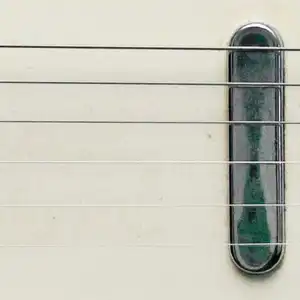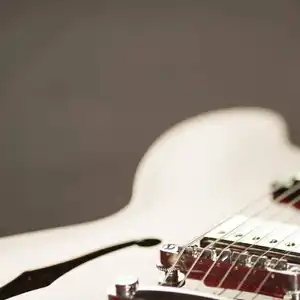What Are Stainless Steel Bass Strings Good For?


At Stringjoy we love to talk about strings, and bass strings are no exception. When it comes to bass strings, there are more options than you might think—nickel, stainless, roundwound, halfwound, flatwound, etc. As with all strings, each of these has its own advantages, disadvantages, and uses. When choosing strings, it’s all about your preferences and what sound you’re going for.
Today though, we’re going to focus on one of our favorites — roundwound stainless steel bass strings, to celebrate the launch of our newest line of strings, Stringjoy Rangers Stainless Steel Bass Strings. Roundwound stainless steel bass strings are some of the most important and recorded in all of rock music, so they certainly warrant their own discussion. We’ll cover their history, how they sound and feel, what genres they’re good for, and what pros used roundwound stainless steel bass strings to get their signature sound.
Without further ado, let’s take a deep dive into the world of stainless steel bass strings.

History of Stainless Steel Bass Strings
The history of stainless steel bass strings is actually pretty interesting, so keep reading to find out how roundwound stainless steel bass strings came to dominate the market.
Beginnings
Stainless steel bass strings may seem like a permanent fixture in the bass world, but the history of stainless steel bass strings show that they’re actually a fairly recent invention. Prior to the invention of roundwound bass strings, the only option on the market was flatwound strings. This left bassists with limited options and stuck with the flatwound sound.
In 1958, a company by the name of Orchestral and Jazz Strings was founded by James and Ron Howe. They started with a focus on zither strings, but they were already making guitar strings for companies like Vox and Eko by the early 60s. They were also making electric bass strings at the time, though they only offered flatwounds. That would soon change however.
In 1962, the company introduced the first set of roundwound electric bass strings. They were called a “swing bass set,” and they quickly became popular amongst “beat” groups of the time like The Kinks. The strings produced a brighter and more distinct sound, giving bassists more tonal options. They also decided to rebrand the company around the same time, going from Orchestral and Jazz Strings to the much catchier Rotosound. With roundwounds on the rise, Rotosound would soon create a legendary set of strings with the help of an equally legendary bassist.
John Entwistle and Rotosound
Prior to his connection with Rotosound, John Entwistle of the Who used various flatwound strings by Fender and Labella. However, he was never satisfied with the sound. At some point in the early 60s, he started using the Rotosound “swing bass set” and was fairly satisfied with them. Still, he felt there were improvements to be made.
In 1966, Entwistle contacted Rotosound to let them know that the E and A strings didn’t vibrate properly. Rotosound invited him to come to their facility and help them troubleshoot the strings. They fiddled around with the wire binding for a few hours, but then they realized the issue was that the cores of the strings weren’t big enough. They made the cores thicker and beefed up the gauges a bit for Entwistle’s preference, and he finally had the perfect set of bass strings.
Not long after, Rotosound asked Entwistle if they could use his name and sell the strings commercially. He obliged, so long as they continued to provide him with free strings. And so, the legendary Rotosound RS66 strings were created—arguably the most popular and recorded set of roundwound stainless steel bass strings.
Sound and Feel
With the history covered, now it’s time to talk about what really matters—the sound and feel of stainless steel bass strings.
Sonically, stainless steel strings tend to be brighter and crisper than nickel strings. This makes them very well suited for rock, funk, slapping and popping, pop, and other more modern styles. Nickel strings on the other hand tend to be warmer and less bright. They are a great choice for classic rock, jazz, motown, or other styles that require a warmer bass sound.
In terms of feel, stainless steel strings are more abrasive than nickel strings. That means they have a rougher feel to them, which can create more string noise and make moving around on the strings tougher. That said, many players prefer the grip they get with stainless steel bass strings.
Nickel strings feel a bit more smooth and slick than stainless steel strings. This allows for quiet slides up and down the fretboard and easier movements. However, nickel strings can also feel a bit too slick for some players.
Roundwound vs Flatwound
It’s also important to mention that they do make stainless steel flatwound strings, and there’s a huge difference in sound with roundwounds vs flatwounds.
In general, flatwounds sound more warm and muted than roundwounds. This can be a pro or con depending on what sound you’re going for. Jazz players commonly use flatwounds because they provide the big, bassy, warm sound they are looking for, while also minimizing string noise. Flatwounds can also be used in other styles like rock too, and they can have surprisingly great results. Flatwounds also feel smoother and more slick than roundwounds, which can be good or bad depending on your preferences.
Roundwounds are generally brighter than flatwounds and are more common for most styles of music. Though they create much more string noise than flatwounds, many prefer roundwounds for their punchy and cutting tone, as well as their better grip than flatwounds.

Common Questions
We see a lot of the same questions crop up in any discussion about stainless steel bass guitar strings, so before we get into the famous players that favor(ed) stainless steel bass strings, let's go over some common questions and considerations of stainless strings.
Do stainless steel bass strings last longer?
Good question! The answer is yes, and no, depending on what you are looking for. If you are looking for a string that will remain structurally stable and continue to intonate and hold tuning properly, then yes stainless steel strings will last for years. But tonally, stainless steel strings do experience some of the same tone roll-off of nickel wound strings that increases as they age. Now for many players who like the sound of strings that are broken in a bit, this is good news—they do hold that broken in sweet spot for quite a long time. But for slap-style players who are looking for that fresh-out-of-the-pack brightness, sadly you will want to change your strings with some regularity to keep that intact.
Do stainless steel bass strings cause fret wear?
Where your frets meet your strings, two metals are colliding and rubbing, and whichever of the two is softer will take the brunt of the wear. Traditional "nickel silver" frets are an alloy of nickel, copper, and zinc, which are all fairly soft materials. Because of this, stainless steel (which is comparatively very hard) strings will wear these frets more than nickel wound strings. This isn't to say that you'll have to get a refret tomorrow though¯just a little quicker than you might otherwise. For instruments with stainless steel frets however, this is not a concern.
How to identify stainless steel bass strings?
Let's say you purchased a bass from a shop and never changed the strings on it, because you liked how they played and sound (this happens a ton by the way so you're not alone). How do you know if the strings you've been digging were nickel wound or stainless steel? The easiest way is to look at the color of the wrap wire. Nickel wound strings have a bright silver appearance, where stainless steel bass strings have a dark, almost gunmetal grey hue to them.

Famous Players
Without further ado, let's talk about the wealth of bass giants that have favored stainless steel bass guitar strings over the years...
Jaco Pastorius
What else can be said about Jaco? If you’re on this page, you are probably already well acquainted with his music and accolades, so I’ll keep it short.
Jaco Pastorious is one of the most important and well-regard bass players of all time. Just listen to a snippet of him grooving on the classic Teen Town, and it’s not hard to see why.
Jaco famously used Rotosound stainless steel roundwound bass strings for most of his career, and he doubtlessly inspired many bass players to put the same strings on their basses.
https://www.youtube.com/watch?v=I63bOi477cA
Noel Redding
Noel Redding is another legendary bass player who has been discussed endlessly. He was in the Jimi Hendrix Experience. Does it get any more legendary than that? I don’t think so.
He was also a devotee of Rotosound stainless steel bass strings, though he preferred the original swing bass set from before the Entwistle collaboration. Check out this classic clip of Foxy Lady from the Miami Pop Festival.
https://www.youtube.com/watch?v=_PVjcIO4MT4
John Paul Jones
Another fan of Rotosound swing bass strings, John Paul Jones has long favored roundwound stainless steel bass strings and still uses them to this day. Jone’s bass playing in Led Zeppelin inspired countless players to pick up a bass, and he’s one of the most important well-loved bassists of all time. The classic Ramble On is a perfect example of Jone’s incredible bass playing and stainless steel infused tone.
https://www.youtube.com/watch?v=LzGBQerkvWs
Geddy Lee
Few bassists have the status, acclaim, and following that Geddy Lee has. His playing in Rush is some of the best bass playing ever put to record, no question. Basslines from Moving Pictures, Hemispheres, and 2112 have all become standards in the bass world, and they have become highwater marks for bass playing in general.
Geddy uses the aforementioned Rotosound RS66 strings, and they have been a perfect fit for his playing. He is one of the most prominent users of the RS66 strings and roundwound stainless steel bass strings in general.
This bass solo from 2011’s Time Machine tour is a perfect display of Geddy’s stunning technical ability and singular tone.
https://www.youtube.com/watch?v=HGdQUMzRVxA
Conclusion
Stainless steel bass strings are a fairly modern invention that has changed the bass game. Since their introduction, they have been used by greats such as John Entwistle, Noel Redding, Jaco Pastorius, and more. Stainless steel bass strings provide a bright, punchy, and clear tone that has been heard on countless classic records.
They are a great choice for all different types of music and are remarkably versatile, especially if you consider both roundwounds and flatwounds.
If you’re looking for a set of roundwound stainless steel bass strings, we highly recommend checking out a set of Stringjoy Rangers stainless steel bass strings, so you can get the famous tone of stainless steel, alongside the quality and craftsmanship we are known for.
With our Rangers, we aimed for something of a tonal middle-ground. While we wanted these to have the top-end presence stainless steel is lauded for, we also wanted a set that wouldn't feel thin or harsh to a player who is more used to Nickel Wound strings. We think these are the most balanced stainless steel bass set on the market, and we think if you try a set, you'll agree.
Other Posts you may like

Guitar Strings Order: How the Guitar is Tuned and Why

Two Handed Tapping: Our Top 8 Tappers of All Time

Which Guitar Strings Wear Your Fret Wire Down More?

What is Nashville Tuning? Its History, Best Guitar Strings & Uses

Guitar Scale Length Explained: String Tension & Playability

What Guitar Strings I Used To Play...
0 Responses
Leave a Reply
Your email address will not be published. Required fields are marked *

